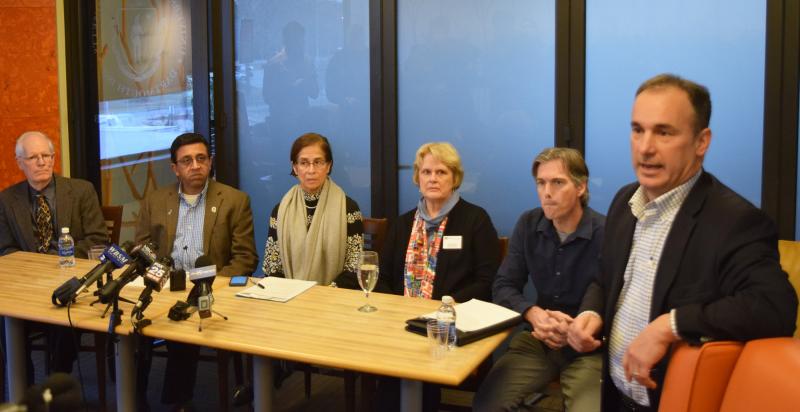University officials support detained professors
University officials have sharp words and deep concerns over President Donald Trump's immigration ban after it left two of its professors detained at Logan International Airport over the weekend.
The professors, married couple Mazdak Pourabdollah Tootkaboni and Arghavan Louhghalam, returned to the United States from an academic conference in France on a 5:30 p.m. flight on January 28. The two were immediately detained for about three hours under President Donald Trump’s executive order banning those from seven countries – Iran, Iraq, Sudan, Libya, Yemen, Syria and Somalia – from entering the United States for 90 days.
Dr. Ramprasad Balasubramanian, the Associate Dean of the College of Engineering, was immediately alerted to the professors' detention. In constant communication with family members, it was a tense few hours as information was scarce.
“We would get some information back but not a whole lot; they couldn’t use their cell phones while they were in detention,” Balasubramanian said.
Balasubramanian said the professors were released three hours later in high spirits. They were treated well, he said.
The pair filed a petition in Boston Federal District Court for their release. The order initially covered holders of United States green cards and visas, and permanent residents of the United States. Tootkaboni and Louhghalam are both lawful permanent residents of the United States, are Iranian nationals and are Muslim, according to the petition.
That petition resulted in an early Sunday morning temporary restraining order, issued by Judge Allison D. Burroughs and Magistrate Judge Judith G. Dein, barring the government from carrying out a majority of the order.
The university community includes a total of 24 people from countries affected by the ban: 15 students, one scholar conducting research at the university, and eight employees. Tina Bruen, Executive Director of International Education, has been in contact with them to ensure they are safe.
“We’ve been in contact with all of them. We are in contact with the general counsel’s office as well with the UMass system. We’re watching this situation very closely,” Bruen said.
Dr. Robert Peck, Dean of the College of Engineering, said as soon as he learned of Tootkaboni and Louhghalam’s detention, he made sure he knew the status and location of the other four engineering faculty affected by the ban. All were safe and none had any travel plans, Peck said.
Peck said Tootkaboni has been teaching at the university since 2010. He was most recently promoted to associate professor in 2016. Louhghalam joined the university in 2016 after working for five years as a postdoctoral research associate at MIT. Both came to the United States between 2005 and 2006, Peck said.
With the immediate crisis resolved, university officials worry that their experience over the weekend is just the beginning. Dr. Douglas Roscoe, a political science professor and president of the Faculty Senate, spoke with faculty members about their concerns.
“There’s a lot of concern with what this executive order means down the road for our university and higher education in general,” Roscoe said. “Higher education relies on a global draw to be successful. We look for the best and brightest both for our faculty and students.”
Bruen added that if the immigration ban is extended or expanded, it could prevent the university from taking in international students.
“There’s long term implications in finding new people from all over the world to be a part of this intellectual community,” Bruen said. She added it’s already hard for international students to travel, even to visit their families.
In a written statement sent to the campus community, Interim Chancellor Peyton R. Helm and Provost Mohammad Karim condemned the immigration ban.
“We want to be clear that we believe the executive order does nothing to make our country safer and represents a shameful ignorance of and indifference to the values that have traditionally made America a beacon of liberty and hope,” the statement read.















